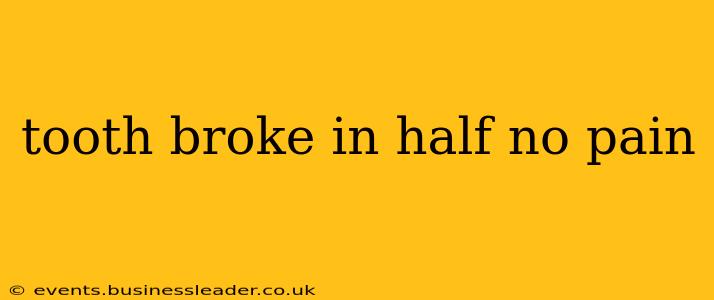A cracked or broken tooth can be a frightening experience, but the absence of pain can be even more perplexing. While it might seem less urgent without pain, ignoring a broken tooth is risky. This comprehensive guide explores the potential causes, necessary actions, and long-term implications of a tooth breaking in half without causing immediate pain.
Why Did My Tooth Break in Half Without Pain?
The lack of immediate pain after a tooth breaks can be attributed to several factors. The nerve inside your tooth might not have been directly damaged, particularly if the break is on the outer enamel layer and hasn't reached the dentin or pulp. Sometimes, the break is so gradual that the nerve hasn't had time to register the injury and send pain signals.
What Should I Do If My Tooth Broke in Half?
The absence of pain doesn't diminish the urgency of the situation. Here’s what you should do:
- Rinse your mouth gently: Use warm salt water to clean the area and remove any debris. Avoid aggressive rinsing that could dislodge the broken pieces further.
- Locate the broken pieces: If you can find the pieces, carefully store them in a container with milk or saline solution. This might help if your dentist can reattach them.
- Apply a cold compress: This can help reduce any swelling that might occur later.
- Contact your dentist immediately: Even without pain, a broken tooth requires professional attention. Delaying treatment can lead to infection, further damage, or even tooth loss.
What Happens If a Broken Tooth is Left Untreated?
Leaving a broken tooth untreated can have severe consequences:
- Infection: Bacteria can easily enter the exposed dentin and pulp, causing an infection that can spread to the surrounding tissues, potentially leading to an abscess.
- Further damage: The break can worsen over time, leading to more extensive damage and requiring more complex and potentially costly treatment.
- Tooth loss: In severe cases, the tooth may become unsalvageable and require extraction.
Types of Tooth Fractures
Understanding the type of fracture is crucial for appropriate treatment. Common types include:
- Fractured Cusp: A small chip or break off the chewing surface of the tooth.
- Cracked Tooth: A crack that extends from the chewing surface down towards the root.
- Split Tooth: The tooth is split vertically into two or more parts.
- Vertical Root Fracture: A crack extends from the root upwards, often difficult to diagnose.
How is a Broken Tooth Repaired?
Treatment for a broken tooth depends on the severity and location of the fracture. Options include:
- Dental bonding: For minor chips and cracks, your dentist may use composite resin to fill and restore the tooth.
- Dental crown: For more significant fractures, a crown (a cap) is placed over the tooth to protect it and restore its shape and function.
- Root canal treatment: If the fracture reaches the pulp, a root canal might be necessary to remove the infected tissue and prevent infection.
- Tooth extraction: In cases of extensive damage, the tooth might need to be extracted.
Can a Broken Tooth Heal on Its Own?
No, a broken tooth will not heal on its own. The hard tissues of the tooth are not capable of regeneration. Professional intervention is always necessary to prevent further complications.
How Much Does Fixing a Broken Tooth Cost?
The cost of repairing a broken tooth varies greatly depending on the type of fracture, the treatment required, and your location. It's best to contact your dentist for an accurate estimate.
How Long Does it Take to Recover from a Broken Tooth Repair?
Recovery time depends on the type of repair. Minor procedures like bonding might require minimal recovery time, while more complex procedures like root canals or crowns might take several weeks.
This information is for general knowledge and does not constitute medical advice. Always consult with a qualified dentist for diagnosis and treatment of any dental issues. Your dental professional can accurately assess your specific situation and recommend the best course of action.
